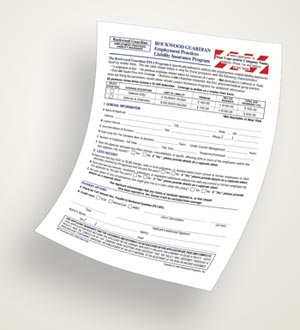|
EPLI protection for small and middle market companies Rockwood's EPLI program protects the client, and ultimately the agent against E&O exposures By Phil Zinkewicz
The relationship between employers and employees in the United States has changed considerably in a relatively short period of time. Thirty years ago, by and large, there was not the adversarial relationship that too often exists today. As a result, there is a greater need for specialized insurance products that reflect those changes. Employment practices liability insurance (EPLI) has been available on a stand-alone basis since the early 1980s. The product was developed to provide protection against allegations arising from the employer/employee relationship. It shields employers, directors, officers, and the corporate entity from allegations of a variety of wrongful employment acts, including sexual harassment, age discrimination, wrongful termination, etc., alleged by any current, former, and prospective employees. The American International Group (AIG) was one of the first carriers to offer a stand-alone EPLI product. As the president of Morefar Marketing (AIG’s wholly owned brokerage operation), Glenn Clark was given the task of introducing the coverage to the small to middle market segments. Previous efforts to market the coverage had failed because of complex applications, lack of communication regarding the need for the product, and the mistaken impression that GL and D&O contracts covered employment-related issues. Through many innovations, including agency sales aids and communications tools to help them market the product, AIG was able to develop a $14 million book of small account EPLI business in less than three years. In 1996, Clark left AIG to establish Rockwood Programs, Inc. It was soon decided that employment practices liability would become the flagship product offering of the new agency. In order to differentiate itself from the competition, Clark says Rockwood pioneered many “cutting edge” workflow innovations. Over time, most of these methods have become an industry standard. These innovations include: • A streamlined submission process, highlighted by a short-form, two-page application and paperless compliance. • A quote indication, allowing agents to secure a non-binding estimate of premium on a risk by providing basic information—and not having to complete a full submission. • A Web site providing agents with access to an inventory of downloadable marketing materials and the capability of generating quote indications online in real time.
These changes have been well received in the marketplace, according to Clark. Since 1997, Rockwood has placed nearly $100 million in stand-alone EPLI business. This success has done nothing to quell the competitive spirit within the agency. “We’re not content to rest on our laurels,” says Darryl McCallin, operations vice president. “We’re looking at several big announcements in 2006. A broader, more competitive policy form will be unveiled early in the year. Agents will soon have the option of receiving policy outputs electronically. Our preferred producers will also be able to make bind requests online.” Rockwood has established other distribution channels for EPLI, including the following: Write-Your-Own. This concept was modeled after the National Flood Insurance Program. The WYO facility allows insurance carriers to offer EPLI coverage to their clients on their own paper with a fraction of the attendant downside risk. Participating companies achieve a level of product differentiation on their existing portfolio by adding a sub-limit of EPLI to their GL, BOP, E&O, or CPP policies. Embedding EPLI on a book of business brings product differentiation, affordability of coverage, and availability of coverage to segments that otherwise could not afford it on their own, says Clark. “The WYO program has given our insureds access to coverage that would be cost prohibitive otherwise,” says Julie Beathard, assistant to the vice president of American Resources Insurance Company. “As for us, the WYO is a value-added service to our portfolio, and it enhances our relationship with Rockwood.” It didn’t take long for Rockwood to figure out a way to adapt the Write-Your-Own concept to benefit managing general agents and program specialists. Firms with significant blocks of BOP, workers compensation, general liability, or E&O business also have the option of attaching a separate limit of EPLI to their entire portfolio. This initiative (appropriately called Portfolio EPLI) has the ancillary benefit of spreading the risk, reducing premiums charged for the EPLI portion and, of course, differentiating the core product from others in the marketplace. Franchise EPLI. Several years ago, the Rockwood team launched an initiative aimed at establishing specialized EPLI programs tailored to franchises. Aspects that make this particular class of business attractive include: Homogeneous risk characteristics. Identifiable decision-making chain. Either a finite number of franchise owners (each controlling multiple stores) or a single corporate office with the authority to mandate coverage as a prerequisite of franchise ownership. Streamlined administration. Simplified rating algorithms, short-form applications, limited coverage policy form, and a minimal number of limit/retention options. “We’ve been with Rockwood since the company started up in 1996,” says Glynne Simpson, president of the Jackson, Mississippi-based Sports & Fitness Insurance Corporation. “We buy the EPLI coverage as a package deal, which is cost efficient for us and for our clients. We’ve been able to add the coverage to our package policy for as little as $125 per client,” says Simpson. Rockwood Guardian. The agency just recently launched an EPLI product specifically developed to meet the needs of small employers. Companies with 15 employees or fewer are eligible for the coverage. The product is being marketed under the name of The Rockwood Guardian EPLI Program. “We have done a great deal of research on the matter,” says Glenn Clark. “Many smaller employers simply cannot afford to purchase the EPLI coverage that is currently available in the market. As you know, ‘traditional’ stand-alone programs often have minimum premium requirements in the $1,500 to $2,000 range. The Guardian EPLI product provides meaningful coverage for as little as $500. We believe that we have eliminated the pricing problem in the under-15 employee market segment. We’re even able to offer human resource risk management with the program to help the group that perhaps needs it the most.” “There is another issue that is especially important when dealing with smaller companies,” adds McCallin. “These firms are under the mistaken impression that they are already covered for employment-related exposures under their existing policies. As we all know, most BOP, workers compensation, general liability, and professional liability forms specifically exclude employment-related exposures. Agents failing to proactively educate their insureds may be opening themselves up for an E&O claim. “Rockwood provides agents with the sales tools they need to market Guardian EPLI to their smaller clients,” he continues. “These promotional aids include brochures, answers to frequently asked questions regarding the coverage, and claims scenarios.” Rockwood will supply additional support for those producers willing to offer Guardian EPLI on all of their new business and renewal accounts. “We incurred the expense of branding Guardian applications for agents in exchange for some level of production commitment,” states McCallin. “Rockwood’s marketing department will include the logo, address, and contact information of our agent-partners on applications, brochures, and other promotional materials.” “We offer this product to all of our commercial liability renewals,” says David Dickie, president of the San Antonio-based Solutions Group, a retail insurance broker. “It makes it easy to approach the client, offers low premiums for lower limits of coverage, and is easy to quote. Within the first two weeks of offering the coverage, we sold three of four policies and we anticipate a great many more sales as the year progresses,” he says. Clark summarizes: “It is our goal to have retail P-C insurance agencies methodically offer EPLI, via the Guardian, on every new and renewal quote for BOP and GL. If an agency employs this discipline, what will happen? First, they will differentiate their quotes from their competitors. Second, they will mitigate their own E&O exposures because many of their clients think they already have the coverage. Third, they will be offering access to a coverage at a price that was previously unheard of in the industry. And, finally, they may even make some sales.” * For more information: |
|||
|




